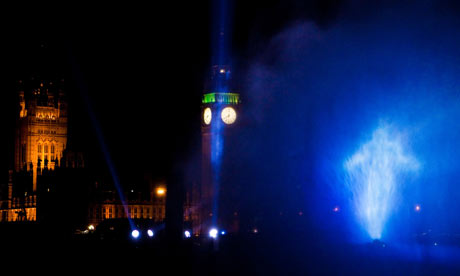
We had been promised an "unthinkable" spectacle: a 70ft tall projection of Dr Manhattan, the omnipotent cyan superhero of Zack Snyder's film Watchmen, would rise from the Thames and tower over a boat filled with awestruck members of the press.
In the end, it was rather less impressive than that. Watching from the Golden Jubilee river cruiser, munching on free miniature shepherd's pies, we could just about make out something blue and flickering on the shoreline. Eventually, the projectionist – using what was apparently the largest device in the world – switched the image to the familiar Comedian blood-spattered smiley face, whose bright yellow visage showed up rather better against the night-drenched South Bank.
Fortunately, the success of Watchmen, Snyder's ultra-violent, overtly sexualised adaptation of Alan Moore's graphic novel about masked vigilantes in an alternative 1980s, is not reliant on a gaudy publicity stunt. That's probably a good thing, because this one was not even as cool as the giant inflatable Simpsons "spiderpig" released over London to coincide with the release of the big-screen version of the adventures of Springfield's most famous residents a couple of years ago.
It was, however, a reminder that even in these financially stricken times, there remains plenty of cash available for such follies. Box-office receipts tend to be up in times of recession, mainly because cinema tickets are a relatively cheap form of entertainment, and the studios are clearly not short of a bob or two.
Watchmen, which hits cinemas tomorrow, could well capitalise on the current buoyant market to post excellent figures. (Analysts in the US are predicting it may make about $60m there in its opening weekend, which would put it among the top March film premieres of all time. But such a success would fly in the face of some very mixed reviews. The film has polarised critics in a way not seen since Peter Jackson's Lord of the Rings trilogy.
While Jackson's films were generally well-received, there was the odd reviewer who simply did not get Tolkien's fantasy world of elves and goblins, who simply refused to buy into it. The Guardian's own Peter Bradshaw was one, remarking of the first film in the triptych, The Fellowship of the Ring, that it required a "leap of faith" into Middle Earth that he was unable and unwilling to make.
Watchmen faces a similar problem. While geeky sites such as Ain't It Cool News have been all over the movie ever since it became clear Snyder was planning a version faithful to the original comic book, there are many more mainstream writers who have been left utterly nonplussed. Their sympathies are not won over by the fact that, as fans frequently point out, Time magazine put Watchmen in its list of the top 100 novels of all time – that's novels, not graphic novels. Because, despite its cerebral high-mindedness, its epic scale and its unashamed, unflinching examination of the rather leftfield topic of superhero existential dread, this remains, in their eyes at least, just another comic-book movie, complete with costumed adventurers and sneering supervillains.
"Snyder and writers David Hayter and Alex Tse never find a reason for those unfamiliar with the graphic novel to care about any of this nonsense. And it is nonsense," wrote The Hollywood Reporter's Kirk Honeycutt. "When one superhero has to take a Zen break, he does so on Mars. Of course he does.
"The real disappointment is that the film does not transport an audience to another world, as [Snyder's previous film] 300 did. Nor does the third-rate Chandleresque narration by Rorschach help."
Honeycutt's reaction is a typical one: it criticises not Snyder's adaptation, but the ridiculousness of the storyline and style borrowed from the original comic book. And therein lies the problem: comic books are silly. They follow a form that is highly fixed and familiar to the reader, just as a James Bond spy thriller does. Moore's genius was to subvert that form into something rich and panoramic, creating a new form of fiction built on a scrapbook formula – Watchmen features extracts from journals, superhero memoirs and newspaper articles to gradually fill the reader in on its protagonists' back-stories – arranged around a thrilling central storyline.
Ultimately, however, if you don't like superheroes, and are not all that interested in comic-book tropes, then it won't be all that exciting for you to see them being twisted into new forms and represented on screen – just as, if you don't like wizards and goblins, an adaptation of a fantasy classic that gorges on the histories of both will probably not be for you. And ultimately, all Snyder's hard work to avoid alienating fans while bringing the comic book to cinemas in a form palatable to mainstream audiences will be about as pointless as the efforts of the poor projectionist trying to conjure Dr Manhattan from the murky depths of the Thames last night.
Of course, for those of us who do rather like comic books, that's not so much of an issue.

